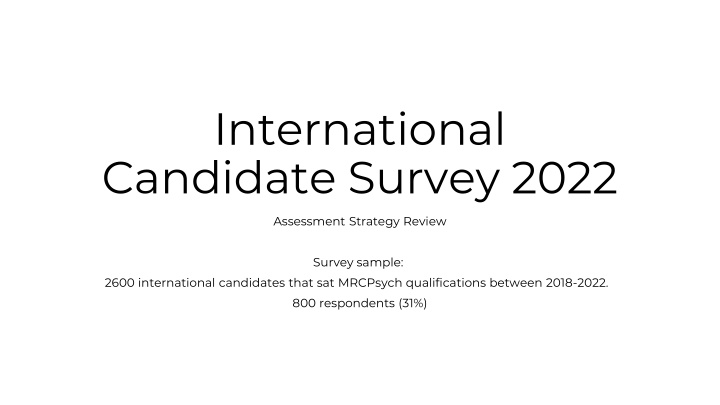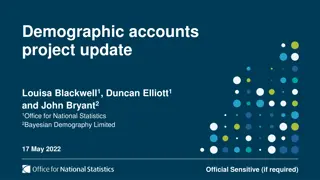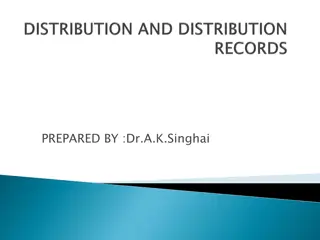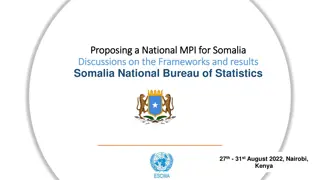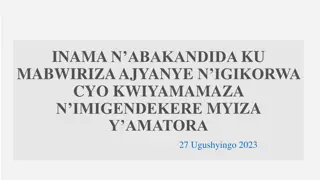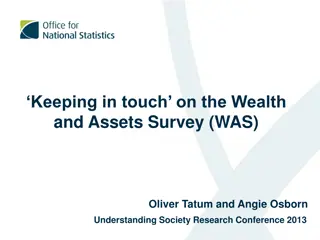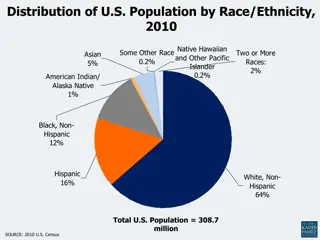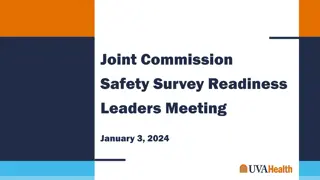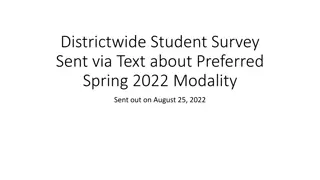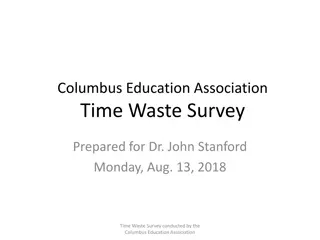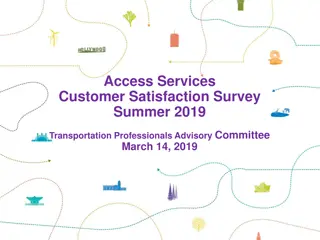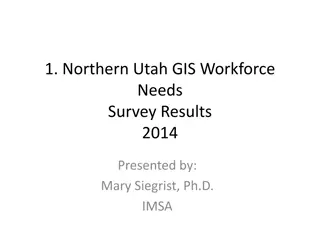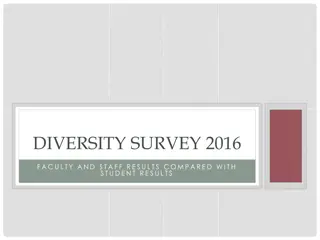International Candidate Survey 2022: Demographic Insights and Country Distribution
Examination of the International Candidate Survey 2022 reveals key insights into gender distribution, ethnic origins, language preferences, and countries where candidates took the Primary Medical Qualification (PMQ). With a sample of 800 respondents out of 2600 candidates who sat MRCPsych qualifications between 2018-2022, the survey provides valuable information for assessment strategies and reviews.
Download Presentation

Please find below an Image/Link to download the presentation.
The content on the website is provided AS IS for your information and personal use only. It may not be sold, licensed, or shared on other websites without obtaining consent from the author.If you encounter any issues during the download, it is possible that the publisher has removed the file from their server.
You are allowed to download the files provided on this website for personal or commercial use, subject to the condition that they are used lawfully. All files are the property of their respective owners.
The content on the website is provided AS IS for your information and personal use only. It may not be sold, licensed, or shared on other websites without obtaining consent from the author.
E N D
Presentation Transcript
International Candidate Survey 2022 Assessment Strategy Review Survey sample: 2600 international candidates that sat MRCPsych qualifications between 2018-2022. 800 respondents (31%)
1. How would you describe your gender? Trainee response % of overall respondents (800) Male 46.3% Female 52.63% Non-Binary 0.125% Prefer not to say 1%
2. How would you describe your ethnic origin Ethnic Origin Number of responses Ethnic Origin Number of responses Any other ethnic group 17 Asian or Asian British - Indian 238 Mixed - White and Black African 9 Asian or Asian British - Chinese 114 Other - Arab 100 Other Mixed/Multiple background 4 Any other Asian background 85 White - English/Welsh/Scottish 3 Asian or Asian British - Pakistani 56 Black or Black British - Caribbean 2 Black or Black British - African 56 Mixed - White and Black Caribbean 2 White - Irish 45 White - Roma 1 Any other White background 26 Asian or Asian British - Bangladeshi 1 Any of Black/African/Caribbean 21 Prefer not to say 20
3. Is English your first language? Trainee % of overall respondents (800) Yes 26.5 No 73.5
4. What country do you live in? Countries Nepal Palestine Bahrain Brunei China Italy Maldives Myanmar Turkey Bangladesh Cayman Islands Germany Greece Jamaica Mauritius New Zealand South Africa Taiwan Yemen Zimbabwe Other Number 3 3 2 2 2 2 2 2 2 1 1 1 1 1 1 1 1 1 1 1 10 Countries Malaysia India Ireland Egypt Nigeria Pakistan Saudi Arabia Hong Kong UAE Singapore UK Malta Qatar Sudan Kuwait Australia Canada Iraq Sri Lanka Trinidad and Tobago Jordan Number 175 174 115 55 34 34 32 31 22 17 11 9 9 7 6 5 4 4 4 4 3
5. In which country did you take your PMQ? Country of PMQ India Malaysia Egypt Ireland Pakistan Nigeria Sudan Hong Kong Romania Australia China Malta UK Jordan Singapore Italy South Africa Sri Lanka Bangladesh Number of Responses 202 108 106 County of PMQ Nepal Palestine Taiwan UAE Germany Myanmar Saudi Arabia Turkey Bahrain Barbados Greece Jamaica Kuwait Mauritius New Zealand Oman Yemen Zimbabwe Other Number of Responders 3 3 3 3 2 2 2 2 1 1 1 1 1 1 1 1 1 1 65 56 44 31 28 16 9 9 9 7 5 5 4 4 4 3 52 Iraq 3
6. Was your undergraduate medical degree in English? Response % of overall respondents (800) Yes 96% No 4%
7. If no, please rate your level of proficiency in spoken and written English. n~36 Poor and Average Good and Very Good Spoken English 19.5% 80.5% Written English 21.7% 79.3%
8. Which exam(s) have you taken? Exam % of overall respondents (800) Paper A 89% Paper B 72% CASC 28%
9. Is MRCPsych a recognised postgraduate qualification by your country s regulator? Recognised by regulator % of responders Yes 65% No 12% Not Sure 22% Other 1%
10. If yes for Q9, please state the name of the regulator in your country. 508 respondents confirmed MRCPsych is recognised in their country. Most mentioned regulators India medical council Malaysia medical council Egyptian medical syndicate Irish medical council Hong Kong medical council Saudi medical council Medical and dental council Nigeria Pakistan medical council Singapore medical Council Sudanese medical council
11. If other for Q9, please expand on your answer below Expansion on other Number of respondents 10 Equivalent for country used 4 Not the top certification 1 Partial Exemption 1 Requires added proof of training 1 Trainee must have studied in the UK 3 Written Papers only accepted
12. What is your main reason for taking MRCPsych qualifications? Reason Respondents % Work / study in the UK 173 22% Career 147 16% Recognition 78 10% Specialist progression 67 8% Knowledge and skills 45 6% Further study 44 6% Training requirement 38 5% Work internationally 38 5% GMC 19 2% Personal 17 2% Job requirement 16 2% RCPsych membership 10 1%
13. How important to you are the following statements regarding your motivations for taking MRCPsych qualifications? Not important and Less Important Important and Very Important Motivation Neutral Not applicable n = To improve your skills and experience To increase your job prospects or salary 4 0.3 2.9 92.7 746 12.7 1.2 9.4 76.1 750 19.9 714 To work in the UK 2.4 13.5 63.6 To work in your country of residence To progress to the next stage of your training in the UK 19 1.7 19.4 59.9 754 17.3 12.9 13.1 56.7 747 22.9 717 To work in another country 4.9 18.1 54.1
14. If you're taking MRCPsych qualifications to work outside the UK, what country are you planning to work in? Countries Ireland Australia Malaysia UAE Singapore India Canada Saudi Arabia Egypt Hong Kong New Zealand Pakistan Qatar USA Malta Oman Number of responders 115 107 92 50 35 33 24 15 14 13 10 10 10 9 7 4 Countries Italy Sudan Brunei China Kuwait Nepal Palestine Bangladesh Iraq Jordan Mauritius Myanmar Trinidad and Tobago Zambia Other Number of responders 3 3 2 2 2 2 2 1 1 1 1 1 1 1 16
15. Based on your perception and/or experience with digital and face-to- face exam delivery, how do the following factors compare? % Factors Face to face is better Same/ similar Digital is better Don t know / NA 15 12 66 7 Accessibility (location) 7 5 86 3 Convenience (travel time) 4 6 87 3 Cost (transport/hotel/exam fee) 22 16 59 4 Exam conditions (quiet, comfortable, free from distractions) 5 9 83 4 Health and Safety (e.g., social distancing, sanitation) 44 23 25 8 Invigilation (ability to obtain help if experience issues) 17 38 37 8 Information/support pre-exam (registration etc.) 31 33 30 6 Information/support during exam (guidance/instruction/time remaining/ announcements) 20 33 36 11 Ability to take a break (i.e.. toilet, breastfeeding, religious practices) 27 18 45 11 Quality of access to computer hardware (speed, monitor size, readability, font size, colour...) 16 25 54 6 Ability to manage anxiety and stress before and during the exam 34 27 32 7 Being sure that I will be able to complete the exam
15.Based on your perception and/or experience with digital and face-to-face exam delivery, how do the following factors compare. Filtered to show only candidates who have sat the CASC. Factors Face to face is better Same/ similar Digital is better Don t know / NA 14 11 71 6 Accessibility (location) 4 4 89 2 Convenience (travel time) 1 4 92 1 Cost (transport/hotel/exam fee) 23 15 60 2 Exam conditions (quiet, comfortable, free from distractions) 2 5 91 2 Health and Safety (e.g., social distancing, sanitation) 42 26 22 9 Invigilation (ability to obtain help if experience issues) 14 42 37 7 Information/support pre-exam (registration etc.) 26 36 28 8 Information/support during exam (guidance/instruction/time remaining/ announcements) 12 32 49 8 Ability to take a break (i.e.. toilet, breastfeeding, religious practices) 26 12 47 15 Quality of access to computer hardware (speed, monitor size, readability, font size, colour...) 15 25 56 5 Ability to manage anxiety and stress before and during the exam 40 25 26 9 Being sure that I will be able to complete the exam
16. How well do you think you are able to demonstrate the clinical skills below through the different exam delivery methods? Skill Face to face exam is better Same/similar Digital is better Don t know / NA Communication Skills 47 26 17 11 Management Skills 31 37 20 12 Examination (mental state, cognitive, physical and capacity assessment) 54 19 15 11 History taking (including risk assessment) 41 30 17 12
16. How well do you think you are able to demonstrate the clinical skills below through the different exam delivery methods? Filtered to show only candidates who have already sat the CASC (F2f and/or Online). Skill Face to face exam is better Same/similar Digital is better Don t know / NA Communication Skills 54 28 12 6 Management Skills 28 48 17 7 Examination (mental state, cognitive, physical and capacity assessment) 63 20 12 4 History taking (including risk assessment) 33 44 18 5
16. How well do you think you are able to demonstrate the clinical skills below through the different exam delivery methods? Filtered to show only candidates who have already sat the CASC online. Skill Face to face exam is better Same/similar Digital is better Don t know / NA Communication Skills 50 30 14 6 Management Skills 24 51 21 4 Examination (mental state, cognitive, physical and capacity assessment) 60 21 16 2 History taking (including risk assessment) 30 44 23 3
17. How important are the following factors to you? Factors Important and Very Important % Which is better? Face to face Being sure that I will be able to complete the exam 96.4 Face to face The ability to demonstrate my clinical skills 94.5 Digital Exams conditions (quiet, comfortable, free from distractions) 93.3 Digital Convenience (travel time) 91.7 Digital Accessibility (location) 90.9 Digital Cost (transport/hotel) 89.6 Same/similar Information/support during exam (guidance/instruction/time 88 Face to face Invigilation (ability to obtain help if experiencing issues) 87.5 Quality of access to computer hardware (speed, monitor size, readability, font size, colour rendition) Digital 86.9 Same/similar Information/support pre-exam (registration etc.) 85.4 Digital Health and safety (e.g. social distancing, sanitation) 80.3 Ability to take a break (i.e. toilet, breastfeeding, religious practices) Digital 68.8
18. Have you taken the online version of the CASC? Online Version % taken online version Yes 24.6 No 67.1 NA 8.4
19. Which location(s) if any would you be willing to travel to for the CASC exam? (select all that apply) Popularity of locations based on total respondents Region Southeast Asia 35% Europe 30% South Asia 26% Not willing to travel 28% Middle East and North Africa 15%
20. Would you be willing to travel internationally to take the CASC exam face to face? Willing to travel internationally % of responses Yes 40% No 29% Not sure 32%
20. Would you be willing to travel internationally to take the CASC exam face to face? Countries of Respondents not willing to travel Number not willing to travel % India 52 22% Ireland 34 15% Malaysia 34 15% Nigeria 19 8% Egypt 19 8% Hong Kong 12 5% Pakistan 10 4% Saudi Arabia 10 4% Total 230 100%
21. If not willing to travel internationally for the CASC, why not? Reason Responses % Cost 147 53.26% Covid Travel Restrictions 18 6.52% Covid Risk 17 6.15% Prefers Digital 15 5.43% Time 13 4.71% Visa application 11 3.98% Work Commitment 10 3.62% Stress 7 2.53% Family Commitment 5 1.81% Political Situation 4 1.44% Other 29 10.5% Total 276 100%
22. If the College were to develop an international qualification incorporating an alternative to the CASC exam how important is the recognition of the qualification? Not and less important Important and very important Neutral Type of recognition Officially recognised in your country by the regulator 5.2% 10.7% 89.6% Officially recognised in the UK by the General Medical Council (GMC) 2.8% 7.6% 84% Officially recognised as in another country by the local regulator 4% 12.7% 83.3%
23. The college is exploring developing other qualifications it can offer including post- graduate sub-specialty qualifications 24. WHICH SUB-SPECIALTY (SELECT ALL THAT APPLY) 353 303 291 260 Would this be of interest? Yes 757 No 30 195 170 152 123 85 81
25. Doctors working in the UK are evaluated during their higher training using workplace based assessments such as case based discussions. Is this a feature of the training where you are currently studying? Response % of overall respondents (785) Yes 94% No 6%
26. If no for Q25, please tell us what is used in the country where you are studying. Types of Exams Ad-hoc Annual Appraisal Annual Exams Bi-Annual Exams Case based Assessment Case presentation and Log book Clinical and Viva Voce Exams CME Points Detailed history, examination, and management Dissertation and Viva Voce Exam and Performance Examination Examinations, Viva/OSPE and Exit Exam Exams and rotation Exams and Thesis Final Exam Local System no official evaluation PhD style Same as UK Seminars and Supervised work Thesis Research Project
27. Do you have any other suggestions regarding international candidates taking MRCPsych qualifications Main themes for suggestions Number of responses Continuation of Online Delivery (both CASC and Paper A/B) Demand for Training Resources Cost of the MRCPsych Ensuring local delivery of CASC (if moved to F2F) Recommendations on CASC Exam Improvement Recommendations on Written Exam Improvement International Inclusivity Feedback on problems with Pearson Return to Face to Face Difficulty of MRCPsych Entry Requirement to take MRCPsych Positive/Thanks More Diet s per year Hybrid Approach Improve Exam Feedback Other various 53 26 20 17 16 16 15 14 11 11 9 6 6 4 4 24
Key findings Qualification development Recognition of the MRCPsych qualifications by GMC is critical. 96% of respondents were interest in post graduate speciality qualifications. Delivery method Significant benefits of online delivery including accessibility, exam conditions, ability to manage anxiety. Ability to demonstrate clinical skills is perceived to be better through face-to-face exams. Most candidates who have sat the online CASC believe Communication skills and Examination can better demonstrated through face-to-face. Whereas management and history skills are the same/similar. Candidate entries 29% of candidates would not be willing to travel internationally. 32% of candidates are not sure if they would travel.
15. Based on your perception and/or experience with digital and face-to-face exam delivery, how do the following factors compare? Face to face is better Same /similar Digital is better Don t know /NA Accessibility (location) 15.2 12 66.1 6.7 Convenience (travel time) 6.5 4.7 85.9 2.9 Cost (transport/hotel/exam fee) 4.2 6 86.6 3.2 Exam conditions (quiet, comfortable, free from distractions) 21.7 15.8 58.5 4 Health and Safety (e.g. social distancing, sanitation) 4.7 8.5 82.9 3.9 Invigilation (ability to obtain help if experience issues) 43.9 22.9 25.4 7.8 Information/support pre exam (registration etc.) 17.2 37.5 37.4 7.9 Information/support during exam (guidance/instruction/time remaining/ announcements) 31 33 29.7 6.3 Ability to take a break (i.e. toilet, breastfeeding, religious practices) 20.1 32.6 36.2 11.1 Quality of access to computer hardware (speed, monitor size, readability, font size, colour) 27.1 17.5 44.9 10.5 Ability to manage anxiety and stress before and during the exam 16.3 24.6 53.6 5.6 Being sure that I will be able to complete the exam 33.7 27.4 31.8 7.1
17. How important are the following factors to you? Not important at all Not that important Neutral Important Very Important Accessibility (location) 0.3 1.9 6.9 37.3 53.6 Convenience (travel time) 0.4 1.8 6.1 34.4 57.3 Cost (transport/hotel) 0 2.9 7.5 31.3 58.3 Exams conditions (quiet, comfortable, free from distractions) 0 0.3 6.4 32.2 61.1 Health and safety (e.g. social distancing, sanitation) 0.8 3.3 15.6 41.6 38.7 Invigilation (ability to obtain help if experiencing issues) 0.1 0.9 11.5 43.7 43.8 Information/support pre-exam (registration etc.) 0.1 1.9 12.5 42.5 42.9 Information/support during exam (guidance/instruction/time 0.3 1.2 10.5 44.3 43.7 Ability to take a break (i.e. toilet, breastfeeding, religious practices) 1.3 5.6 24.2 40.9 27.9 Quality of access to computer hardware (speed, monitor size, readability, font size, colour) 0 0.9 12.2 42 44.9 The ability to demonstrate my clinical skills 0 0.1 5.3 31.7 62.8 Being sure that I will be able to complete the exam 0 0.1 3.5 27.4 69
